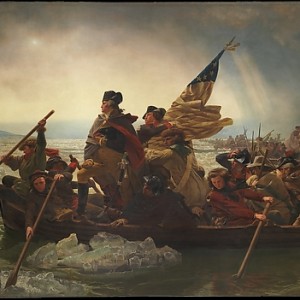Editor’s Note: For another viewpoint, see Point: We Still Need Honest Presidents.
If the claim that George Washington never told a lie were just a harmless little fib, it would be fine.
If the claim were made about James Madison or John Adams or Thomas Jefferson, it would be just one in a long line of platitudes about our Founding Fathers.
Washington, though, is first among equals, the “father of our country” who according to his earliest biographers was practically born virtuous. This seemingly innocent bit of patriotic mythmaking has troubling consequences still being played out today in the continuing caricature of the innocent American. It lives on in the stubborn belief among many of us that ours is the greatest nation in history, a Garden of Eden come to life with a government of freedom-loving people that other nations should seek to emulate.
The bromide about Washington’s immaculate honesty is rooted, of course, in the fairy tale that as a 6-year-old boy, he admitted to his dad that he had chopped down a cherry tree on their property, saying, “Father, I cannot tell a lie.”
Serious historians have found no evidence of this incident, and there is no contemporaneous trace of it during Washington’s life. It first appeared in a book by Mason Locke Weems. And the tale didn’t even make the first edition published in 1800, a year after Washington’s death. Weems added it for the second edition six years later, apparently to help goose sales. Weems was not so much a biographer, but rather a hagiographer. He was an itinerant minister and bookseller, and in his “The Life of Washington” he found a way to fuse the two occupations into a remarkably profitable venture. Weems was intent on portraying Washington as a modern-day fusion of Abraham and Christ, a faultless patriarch who gave birth to a vast nation favored by God.
Weems was unapologetic about his absence of objectivity about Washington, using a clear allusion to Christ’s resurrection in telling a prospective publisher that his plan was “to show that his unparalleled rise and elevation were due to his great virtue.” The subtitle of his book was: “Equally Honorable to Himself, and Exemplary to His Young Countrymen.”
While Weems’ book became an instant bestseller, the transformation of Washington into a mythical, messianic figure had just begun. In 1836, William Homes McGuffey included a story called “The Little Boy and the Hatchet” in his McGuffey Readers, hugely popular grammar school books. Thus was launched the indoctrination of schoolchildren throughout the rest of the 19th century and well into the next, as generations of Americans were taught a gloss of Washington’s character and, by inference, its biblical-like blessing on his patriotic progeny.
The cherry-tree tale is too much even for the Mount Vernon Ladies Association, the first national historic preservation society. Founded in 1853 to save Washington’s dilapidating former estate on the Potomac River south of the nation’s capital named after him, the organization now lists the “Cherry Tree Myth” as the most enduring legend about him.
“Throughout much of his adult life, many sought to perfect the image of the Father of our Nation, and after his death, others sought to deify the man,” the group says.
Beyond merely persisting across the ages, the myth of George Washington has served a darker mission. It’s helped us whitewash the genocide of the original Americans, the rape of their land, the enslavement of Africans, and all manner of imperial adventures abroad, from Vietnam to Iraq — despite the warning from Washington himself, in his Farewell Address as president, to avoid entangling alliances.
There’s little doubt, from his contemporaries’ accounts, that Washington was a virtuous man. His trustworthiness and leadership qualities induced the other founders to choose him as general of the Continental Army, military strategist of the American Revolution, and, following independence, their new nation’s first president.
Yet Washington himself would no doubt have blanched at the notion that he never told a lie. When Martha cooked him a dinner of pigeon and potted meat that got burned in the family hearth, George undoubtedly didn’t tell her it was inedible. More significantly, we can imagine the night of December 25, 1776, so appropriately for American history falling on Christmas. In the hours leading up to the crossing of the Delaware River, immortalized in Emanuel Leutze’s 1851 majestic oil painting, Washington led 2,400 Continental soldiers into the cold woods of Bucks County, Pennsylvania.
In order to keep the attack a surprise and prevent enemy forces from gaining advanced intelligence, he didn’t tell his troops about their mission. Most of Washington’s soldiers were mere boys, many from the countryside, and few were as sophisticated as him. Surely one of his colonels relayed the grumbling among the troops and asked the general where they were going as the sun’s last glimmer faded in the water. Just as surely, Washington didn’t say they were about to sail across an icy river and attack the Hessians, German auxiliaries (mercenaries in today’s parlance) parked on the other bank in Trenton, New Jersey.
At best, Washington’s response was a lie by omission, a diplomatic non-answer. Or the Father of our Nation might just as well have instructed his aide: “Tell the men that we have embarked on a nighttime training mission that will build their characters and make them better soldiers.”
In this moment, as in so many other moments of George Washington’s exemplary life, the mission of building a nascent nation was more important than building a myth of his flawless veracity.


